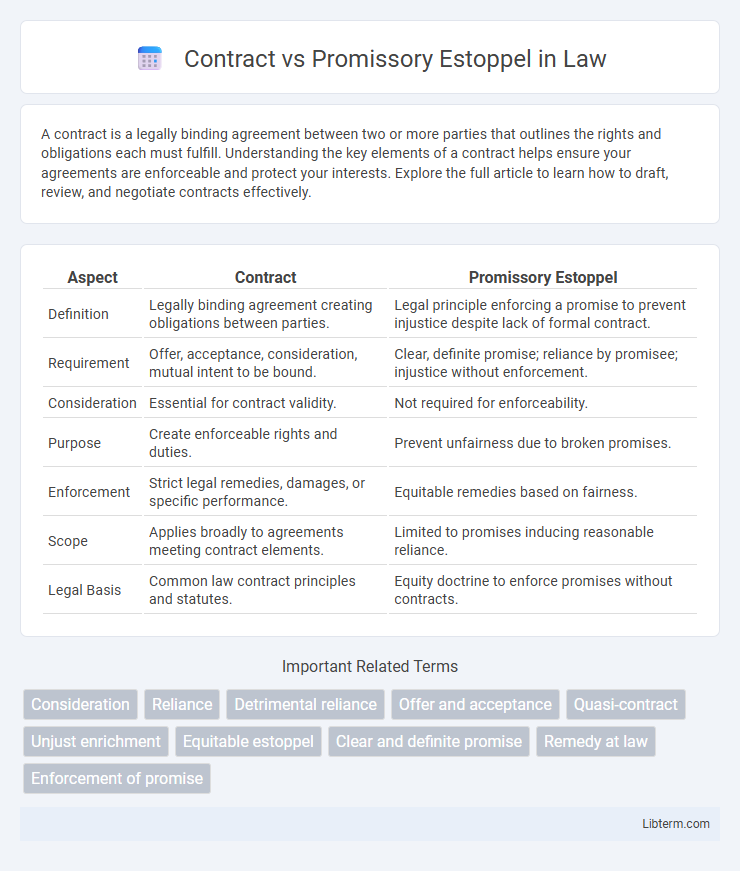A contract is a legally binding agreement between two or more parties that outlines the rights and obligations each must fulfill. Understanding the key elements of a contract helps ensure your agreements are enforceable and protect your interests. Explore the full article to learn how to draft, review, and negotiate contracts effectively.
Table of Comparison
| Aspect | Contract | Promissory Estoppel |
|---|---|---|
| Definition | Legally binding agreement creating obligations between parties. | Legal principle enforcing a promise to prevent injustice despite lack of formal contract. |
| Requirement | Offer, acceptance, consideration, mutual intent to be bound. | Clear, definite promise; reliance by promisee; injustice without enforcement. |
| Consideration | Essential for contract validity. | Not required for enforceability. |
| Purpose | Create enforceable rights and duties. | Prevent unfairness due to broken promises. |
| Enforcement | Strict legal remedies, damages, or specific performance. | Equitable remedies based on fairness. |
| Scope | Applies broadly to agreements meeting contract elements. | Limited to promises inducing reasonable reliance. |
| Legal Basis | Common law contract principles and statutes. | Equity doctrine to enforce promises without contracts. |
Definition of Contract
A contract is a legally binding agreement between two or more parties that creates mutual obligations enforceable by law, requiring offer, acceptance, consideration, and intention to create legal relations. Promissory estoppel, by contrast, is an equitable doctrine preventing a party from withdrawing a promise when the other party has reasonably relied on it to their detriment. The essential element distinguishing a contract is the presence of consideration, which is absent in promissory estoppel scenarios.
Definition of Promissory Estoppel
Promissory estoppel is a legal principle that enforces a promise made without a formal contract when the promisee relies on it to their detriment. Unlike a contract, promissory estoppel does not require mutual consideration but requires a clear and definite promise, reasonable reliance by the promisee, and an injustice that can only be avoided by enforcement. This doctrine prevents promissors from reneging on their promises when such refusal would cause significant harm or unfairness.
Key Elements of a Contract
A contract requires an offer, acceptance, consideration, mutual intent to create legal obligations, and definite terms to be enforceable. Promissory estoppel applies when a promise lacks formal consideration but causes reasonable reliance and potential injustice if not enforced. The key elements distinguishing a contract include clearly defined obligations and mutual assent, whereas promissory estoppel relies on preventing unfair harm from a relied-upon promise.
Key Elements of Promissory Estoppel
Promissory estoppel requires a clear and definite promise made by one party, which the promisee reasonably relies upon to their detriment. The reliance must be foreseeable and substantial, causing an injustice if the promise is not enforced. Unlike a traditional contract, promissory estoppel does not require consideration but enforces the promise to prevent unfair outcomes.
Legal Enforceability: Contract vs Promissory Estoppel
Contractual agreements require offer, acceptance, consideration, and mutual intent to create legally enforceable obligations. Promissory estoppel enforces promises lacking formal contract elements when one party relies on the promise to their detriment, preventing injustice. Courts differentiate enforceability by requiring contracts to meet strict formation criteria, while promissory estoppel applies as an equitable remedy in absence of a valid contract.
Situations Where Each Applies
Contract law applies in situations where there is a clear offer, acceptance, and consideration, creating legally binding obligations between parties. Promissory estoppel is relevant when a party relies on a promise without a formal contract, and enforcing the promise prevents injustice due to detrimental reliance. Common scenarios for contracts include business transactions and sales agreements, while promissory estoppel often arises in cases involving informal promises or preliminary negotiations.
Differences in Remedies Available
Contract law typically allows for remedies such as damages, specific performance, and rescission to enforce the agreement or compensate for breach. Promissory estoppel remedies focus primarily on reliance damages, aimed at preventing injustice by enforcing reliance on a promise even without a formal contract. Unlike contract claims, promissory estoppel generally does not provide for expectation damages or specific performance, limiting the scope of available relief.
Case Law Illustrations
In contract law, the case of *Carlill v Carbolic Smoke Ball Co* exemplifies a valid contract formed by offer, acceptance, and consideration, while *Central London Property Trust Ltd v High Trees House Ltd* illustrates promissory estoppel preventing a party from reneging on a promise despite lack of formal contract. The *Hughes v Metropolitan Railway Co* case further establishes that a party must be estopped from insisting on strict legal rights when a promisee has relied on a representation to their detriment. These landmark cases clarify the enforceability of promises under contract principles versus equitable doctrines like promissory estoppel.
Advantages and Limitations
Contract law provides clear legal framework with defined terms ensuring enforceability and predictable remedies, enhancing certainty in transactions. Promissory estoppel offers flexibility by enforcing promises without formal contracts, protecting reliance interests especially in informal or preliminary agreements. However, contracts require offer, acceptance, and consideration which can limit applicability, while promissory estoppel is constrained by its reliance on proof of reasonable reliance and may not grant all contractual remedies.
Choosing Between Contract and Promissory Estoppel
Choosing between contract and promissory estoppel hinges on the clarity and formality of the agreement; contracts require clear offer, acceptance, and consideration, whereas promissory estoppel enforces promises lacking formal contracts to prevent injustice. Courts prioritize contract law when explicit terms exist, but promissory estoppel serves as a remedy when one party relies on a promise to their detriment, ensuring equitable outcomes. Legal professionals assess the presence of mutual assent and detrimental reliance to determine the applicable doctrine for dispute resolution.
Contract Infographic

 libterm.com
libterm.com